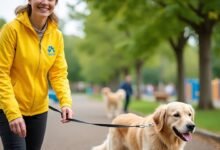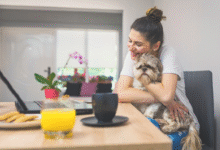
Puppies often use their teeth when they play and look around. It’s how they learn about the world, just like babies do, and it’s a vital part of how they know to get along with other people. When puppies are teething, they will also chew on everything.
Here are a few reasons why puppy biting:
Exploring the World
Puppies learn a lot from biting things, including other puppies, their owners, and inanimate objects. They receive sensory information about how hard they can bite that particular object, what it tastes like, and whether they should repeat that behaviour.
When puppies explore their new home, you might catch them biting or chewing on furniture, rugs, carpeting, pillows, clothing, shoes, remote controls, window frames, door jambs, crates, beds, food bowls, etc.
What to Do if Your Puppy Chewing Your Belongings
Give your puppy a wide variety of puppy toys to chew on, and pick up other household items within their reach that they could chew on.
If you see your puppy biting on inappropriate objects around the house, make a noise to get their attention and then distract them with a toy they can chew on.
Schedule plenty of play sessions and exercise time with your puppy. If you do not give them enough mental stimulation, they may chew on random items to keep themselves busy.
Puppy Teething
Adult teeth start to come in around 12–16 weeks of age, and during this time, you may notice an increase in chewing on objects or yourself. Your puppy’s gums may be sore as they lose puppy teeth and adult teeth come in.
What to Do if Your Puppy Teething
Puppy teething toys can be offered when your puppy is old enough to teethe. These teething toys ease sore gums and are typically softer plastic, so they won’t hurt the baby or incoming adult teeth.
Supervise your puppy when they play with toys to ensure they do not chew off small pieces or swallow them.
Read More: ACL (CCL) Injuries & Surgeries in Dogs
Play Behavior
Some puppies will do a play bow, while others will come up to the other puppy and nip or bite its leg to get it to play. When puppies chew each other, they learn an essential skill: bite inhibition.
Puppies learn how much pressure they can apply with their teeth and what happens when they do so through play biting.
For example, let’s say puppy A and puppy B are playing together. When puppy A bites puppy B too hard and causes pain, puppy B will cry out and refuse to play with puppy A. Puppy B may even move away from puppy A.
Through this interaction, puppy A learns that if he bites that hard, other puppies won’t play with him. So puppy A makes his play bites softer so they don’t provoke pain and cause other puppies to leave.
Some puppies may learn through a one-time process, while other puppies need multiple play sessions with multiple puppies to learn to soften their bite.
What to Do if Your Puppy Biting You to Play
Never encourage your puppy to nip at you by enticing them to chase your hands or toes. Soon enough, your puppy will get older, and their teeth will be sharper. The puppy nip that used to be harmless will turn into a bite that is no longer fun and playful.
If your puppy bites to start playing or during play, make a high-pitched noise and immediately stop interacting with it. Move away from your puppy or briefly into another room and close the door—especially if your puppy is persistent in their behaviour.
Repeat this every time your puppy bites you; they will soon learn not to bite. Without this feedback, your puppy will not know how to temper their bite when playing with you.
Read More: How to Start Training Your Puppy







